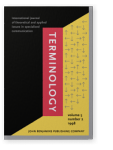Vol. 5:2 (1998) ► pp.183–201
A domain-specific terminology-extraction system
Recently, new technologies have combined to produce a sharp increase in the availability of on-line texts and their access involves end-users with different skills. The demand for tools for information retrieval, extraction, organization and integration is becoming more and more pressing to filter relevance and sort the large number of retrieved documents. It is not the amount of information that gives the value but the access at the right time and in the most suitable form to an acceptable amount of relevant documents. Moreover the increasing availability of new information-transmission technologies demands more personal information filtering. Users are no longer interested in standard summaries and choices; they need (and most of the current user interests are on) filters that they can (directly) specify to fit their preferences and requirements. One such approach could only work on information sources dynamically adaptable to changing application needs. As a consequence the interaction between application domains and information sources needs to be stressed. Natural Language Processing (NLP) tools may be helpful in identifying relevant aspects of documents providing not only the identification of morphologic or structural properties of the texts but also stressing what are salient passages in them. The identification of subsentences capturing relevant terms may be a first step to be acquainted with specific topics of a document. The availability of a system able to capture such terms, in different languages and application domains, could optimize users ' requirements.
Cited by (6)
Cited by 6 other publications
This list is based on CrossRef data as of 10 july 2024. Please note that it may not be complete. Sources presented here have been supplied by the respective publishers. Any errors therein should be reported to them.
